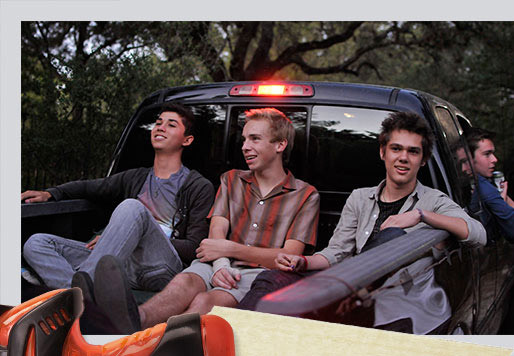Reviewed by GREG KING
Director: Richard Linklater
Stars: Ethan Hawke, Patricia Arquette, Ellar Coltrane, Lorelei Linklater, Marco Perella.
Richard Linklater (the cult favourite Dazed And Confused, etc) is an interesting director who makes projects that often lie outside the mainstream of Hollywood filmmaking (the Before trilogy, etc). His latest film is Boyhood, an ambitious undertaking, a coming of age tale that was 12 years in the making, and required a massive leap of faith on behalf of both the director and its cast and crew.
Linklater devised the idea to shoot a drama that charted the journey to manhood of a boy, and Boyhood follows Mason (played by newcomer Ellar Coltrane) from the age of six to eighteen when he leaves for college and the next stage of his life. We first meet Mason as a cheeky young six year old, and then we follow him over the next twelve years as he matures and grows into a sensitive, thoughtful young man.
Boyhood is a real coming of age tale, that explores those forces that shape him over the years. There are few great dramatic moments, but rather the film unfolds in a quasi-documentary-like observational style that explores the minutiae of everyday life, those moments that shape Mason – an absentee father, his mother’s flawed choice in men, his first crush, his friends and peers, and the advice he receives from friends, family and well meaning teachers.
The logistics of juggling schedules and arranging the same cast and crew to participate in the film over the course of twelve years must have been daunting. Most of the cast are largely unknown, but Linklater cast regular Ethan Hawke, with whom he has a great working relationship, and Patricia Arquette as Mason’s divorced parents.
Hawke’s career has had plenty of ups and downs in that time as he moves between more interesting independent projects and derivative genre films. However he delivers a more subtle and nuanced performance as Mason’s slacker dad, who regularly returns to try and participate in his life, and who also grows up and matures as the film develops.
Arquette was cast as Olivia, Mason’s mother who is so keen to provide stability and a strong father figure for her children that she often makes bad choices. In that time, Arquette’s career took off with her hit series Medium, so to keep her on board for that length of time is quite an achievement in itself.
But one of the most interesting characters here is actually Mason’s sister Samantha (played by the director’s own daughter Lorelei). She is a wonderfully precocious and outspoken character and is interesting in her own right. She actually grew bored with the project early on and asked to be written out of the film. Linklater refused, and eventually Lorelei regained her enthusiasm for the project.
Marco Perella (from tv series Walker Texas Ranger and Linklater’s own A Scanner Darkly, etc) also registers strongly as Mason’s first stepfather, a psychology professor who initially seems nice and caring but soon becomes a controlling monster and a terrifying bully.
Linklater took a huge risk in casting an unknown like Coltrane in the central role of Mason, who is the heart of the film, as he was unsure if he could carry the film. But young Coltrane has an easy going and likeable presence, and plenty of charisma, as he evolves from shy, introverted kid to mature and confident teen who knows what he wants to do in life. While he doesn’t change much physically during the first few years, when he becomes a teenager his body undergoes a lot of physical changes, and his look and attitude seems to change constantly. This is typical of teens as they struggle to find their own identity, their own sense of who they are and where they fit into the world. And by the end of the film, Coltrane has morphed into a Hawke lookalike, which adds to the veracity of the casting.
While Linklater is an interesting filmmaker, he has a distinctly uncinematic visual style. Boyhood is shot in straightforward, quasi-documentary style. A close comparison to Linklater’s aim here would be Michael Apted’s ambitious 7 Up series, in which he followed the growth and changing lives of a group of youngsters from the age of seven, regularly dropping back into their lives every seven years to chart their changing fortunes and attitudes. Not only was it an examination of their lives, but it also reflected the changing society around them.
Another comparison would be watching Angus T Jones grow up on the set of tv sitcom Two And A Half Men. Over the course of twelve seasons he has changed physically , and transformed from a chubby smart mouthed kid into a strapping and hunky young man.
The film is also virtually plotless, but it does follow a cohesive narrative path. But the way in which Linklater has shot the film gives it a real sense of authenticity, a rare honesty in which nothing seems forced. Although Linklater is working from a script, film has a cohesive quality to it. Linklater and cast and crew returned every year to shoot small scenes that would become part of the whole. And of course he had to tweak the script to include some contemporary cultural touchstones and take into account changing technologies and actual events – for example one scene is set during the Obama election campaign – which also gives the film a sense of immediacy and relevance.
And the soundtrack also acts as some sort of guide to the passage of time, as it features everything from Coldplay through to Blink 182, The Hives, Wilco, Bob Dylan and Lady Gaga as well as some 70s rock from Wings and George Harrison.
★★★★




